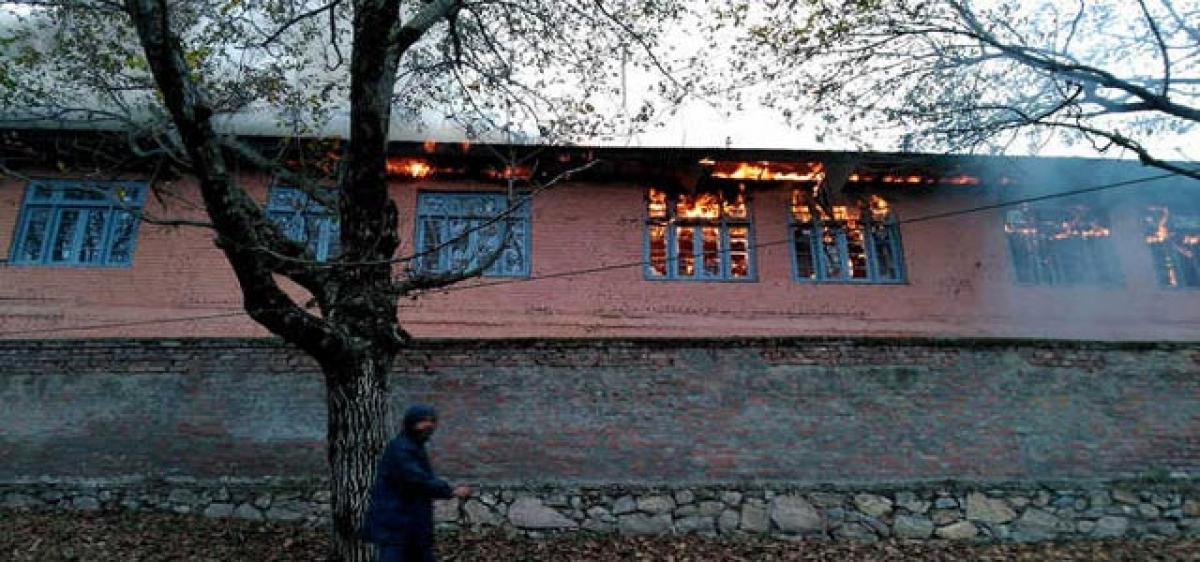Live
- Supreme Court Stays Death Penalty Of Sukhjinder Singh In 2010 Child Murder Case
- Conspiracy against Nitish govt during floor test, says Bihar Police
- Hero Motors withdraws draft IPO papers for Rs 900 crore issue
- Calcutta High Court directs DoPT to be party in case of former Kolkata CP disclosing RG Kar victim’s identity
- Faria leaves everyone buzzing
- Here’s how silent stroke can dent your brain health
- ‘Pottel’ setsa slot for theatrical release
- About 85 pc of world’s cryptocurrencies are not even worth a cent
- ‘Suriya44’: It’s a wrap
- Indian gymnast Dipa Karmakar announces retirement
Just In

A bleak future stares at hundreds of thousands of youth with 27 schools set ablaze in the Kashmir Valley in the past few weeks and all educational institutions shut for five months, leaving them with few options either leave the state, do homeschooling or worse join ranks of stone pelters.
Srinagar : A bleak future stares at hundreds of thousands of youth with 27 schools set ablaze in the Kashmir Valley in the past few weeks and all educational institutions shut for five months, leaving them with few options either leave the state, do homeschooling or worse join ranks of stone pelters. Four months of renewed unrest and violence that has resulted in 92 deaths, the failure of effective governance in the state and the lack of any central government initiative to resolve the political imbroglio have left the common citizens of Kashmir in limbo.
- They have either to choose homeschooling or leave state
- Militants want them to join ranks of stone pelters
- Depressing among youth faced with no education
- Some 1.2 million boys and girls in classes up to 12th standard
- Exams usually begin in Oct for new academic session from Nov
This has particularly affected Kashmiri youth, many of whom are said to have gone into depression with the onset of winter that seems to spread a cold blanket on their future hopes. Those who could afford it have already moved their children to Jammu or Delhi and got them temporarily admitted in schools or private tuition centres.
And those who couldn't are living in despair, suffering the mental trauma caused by the daily shutdown and violence. Shazia Ashraf, a Class 12 science student, like hundreds of thousands of other Kashmiri students, has not attended school in the past nearly five months. This includes the initial two weeks of summer, the Eid vacations and then four months of turmoil.
Shazia was early this week hospitalised after a panic attack. Doctors, according to her family, have diagnosed her with depression. Her parents said she has been self-studying at home all these months. But remaining confined inside the four walls of the house started taking a toll on her physical as well as mental health. "She used to study for 3-4 hours daily initially. But with time, she lost concentration and finally got depressed," her mother, who did not wish to be named, told IANS.
"It is but natural for any student to feel depressed. The situation is such. We do not know whether she will ever be able to focus on studies again." According to official estimates, some 1.2 million boys and girls are currently enrolled in classes up to the 12th standard. The exam season in the valley traditionally begins in October for the new academic session to begin in late November.
So far, barring DPS in Budgam and Srinagar, no school in the Kashmir Valley has been able to conduct examinations. The issue of reopening the schools has become political. The government is accusing separatist leaders, who have been spearheading the unrest and daily protests, of risking the future of Kashmir's children by not allowing schools and colleges to open. The separatist say informally that if they exempt schools from their protest calendar, the government will highlight it as a sign of political normalcy in the valley.
Waheed Parra of the ruling People’s Democratic Party (PDP) said the issue needed to be seen as one that is above politics. "People think that re-opening schools would be against their agitation. This has to be told to those who ask them to shut down that skipping education would only leave us (with a generation of) illiterates," Parra told IANS.
He admitted that the government had failed to reopen educational institutes. "Definitely, the state has less role in facilitating the education this time but all you have is buildings and no students. Those who are against education are shutting the schools." Shahnaz Bashir, an academician and author, said the burning of schools "is connected to a certain politics" directly or indirectly. "I believe that howsoever resistant and critical of the state, no well-meaning student can be so naiveve as to believe that it would be in any resistance movement's interest to burn academic institutions," Bashir told IANS.
But the state government clearly blames the burning of schools on the separatists. Union Home Minister Rajnath Singh has asked the state to help the schools and the Jammu and Kashmir High Court has ordered protection for them and for umasking the "mysterious enemies of education." And as the bitter war of politics continues, it is the common Kashmiri children who are suffering.
By Ruwa Shah

© 2024 Hyderabad Media House Limited/The Hans India. All rights reserved. Powered by hocalwire.com







